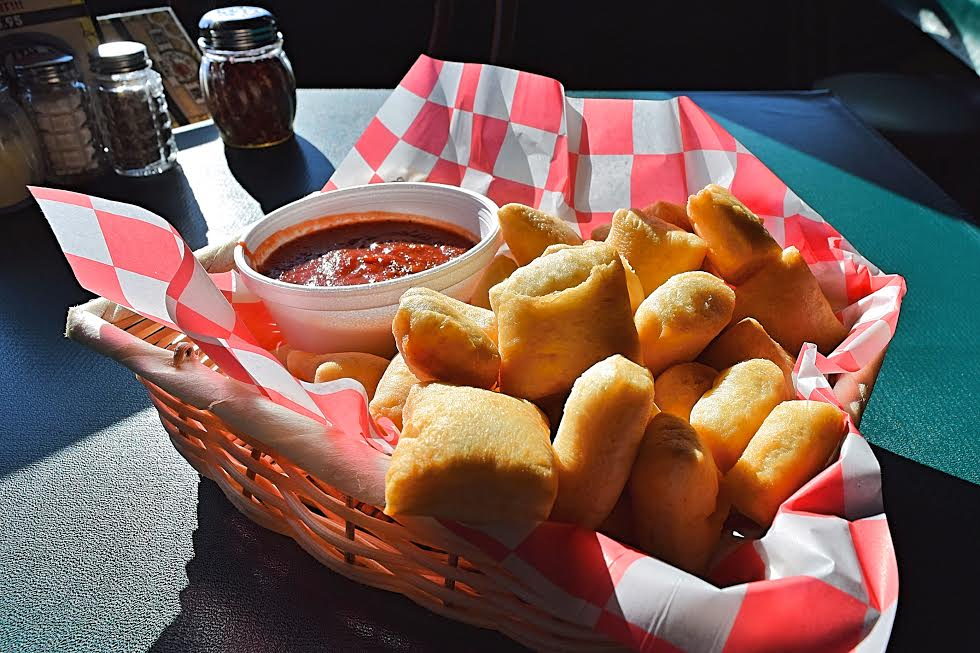Beer Nuggets Are More Than Just Pizza Butts, They're My Everything
There is no food that more accurately represents my hometown than the beer nugget.

The corn-fed college town of DeKalb, Illinois is an agriculture-heavy community nestled in the heart of the Midwest. DeKalb is known for contributing several significant things to the world, such as Cindy Crawford (you're welcome) and barbed wire (you're welcome), but its undeniably most precious and influential invention has largely remained within the confines of the small city: beer nuggets.
No offense, Cindy.
Just like residents of DeKalb, beer nuggets are not fancy. They're simply hunks of fried dough, usually plain or tossed in parmesan, shoveled to customers by the bag or basket-full and served with a side of pizza sauce for dipping. Despite the name, the cheap bar snack doesn't contain any actual beer, but they are often consumed with pitchers of Miller Lite or PBR.
The idea of dough deep fried is certainly not indigenous to north central Illinois. Call it beignets, zeppole, paczki, doughnut holes—even the most humble batters dropped in hot oil until crispy has appeal. No one here is claiming to reinventing the wheel, but for us DeKalbians, it is a secret handshake, a source of civic pride. Of course we'll shout our "discovery" to the world.
It wasn't until I moved to Chicago my freshman year of college that I realized—much to my horror—beer nuggets weren't a thing outside my hometown.
I have since become a one-woman ambassador for the beer nugget. I find myself asking strangers,"Have you ever tried a beer nugget?" And while I sometimes fear I'm losing my mind, those who invented the snack (and former Northern Illinois University students frantically Googling about them) are just as passionate.

To truly understand the beer nugget's legacy in DeKalb, we first need a quick lesson in barbed wire. Even though it had been patented by an Ohio man in the 1860s, market demand made others want a piece of the prickly pie. Three men from DeKalb all vied for a new patent, and in 1874, Joseph Glidden emerged as victor. He put his own spin on earlier designs and now DeKalb touts itself as "where barbed wire was invented."
Yes, he stole the idea from the Ohio man.
Flash forward to the late-1970s, a time when NIU's student population was booming and the mom-n-pop diners that lined university-adjacent streets were looking for a way to capitalize.
One legend of the beer nugget's invention includes a serendipitous food fight at Sgt. Pepper's, a long-shuttered family pizzeria.
In 1989, then-manager Ken Syrek told NIU's student newspaper a fateful employee food fight in the restaurant's kitchen led to the accidental creation when pieces of pizza dough fell into the fryer, resulting in a semi-crunchy, semi-soft morsel.
Others say Sgt. Pepper's was looking for a new menu item and way to maximize its leftover pizza dough, using fried dough chunks as part of its experiment.
Whatever the case, the snack quickly became prolific—and by the mid-1980s the town was in the throes of all all-out nugget war.
Among those at the helm of the movement was Larry Finn, long-time owner of Pizza Villa in DeKalb. Finn said in the early '80s he was looking for a way to get a piece of the action by improving the existing recipe.
Made from scraps of pizza dough, the current product was too crunchy and lacked flavor, more akin to a "won-ton," Finn said.
After five months of experimentation, Finn's kitchen came up with a dough that transcended mere pizza crust. It was the dawn of a new era.

"Like Colonel Sanders," Finn said, he wouldn't give me the recipe, but said it contained water, flour, more yeast than standard pizza dough, and "six secret ingredients" that enhance its flavor, shape, and texture. The accompanying sauce has a breakdown of "90 percent pizza sauce, 10 percent secrets," Finn said.
Before long, Finn was dispatching three delivery trucks to campus a night, each brimming with nuggety goodness. He paid his drivers commission to sell the orders, making kings of young college kids pimping out fried dough bites for a 50 cent-per-order commission.
One nugget slinger was a burly swimmer, on scholarship at NIU, who donned a cape and dealt nuggets by the truckload like they were a controlled substance. That continued on for five years, until NIU cracked down on Finn for "solicitation," he said. Finn was told to stop pimping out nuggets.
In 1990, NIU even offered a one-day course on the town's favorite food. "Intro To Beer Nuggets 101" taught incoming freshman that the nuggets would "very likely become your main staple" while broke and studying in corn town.
Over the years, many of the beer nugget pioneers like Sgt. Pepper's have shuttered, while places like Pizza Villa have emerged as victorious in the race for the area's supreme nugget. New iterations like cinnamon and sugar-dusted varieties have popped up to maintain its legacy. A declining student (and local) populations led the nugget bubble to burst long ago, but Finn says they're still a top-seller, with thousands of orders going out every year.
They are available through Rosati's Pizza, a national chain centered mainly in the Midwest, but getting beer nuggets at Rosati's is like going to Idaho for the fried clams.

To me, beer nuggets are more than just a weird hometown bar snack.
They stood by me when I was in college through all stages of partying: pre-gaming, being wasted, and the inevitable hangover.
If you're from the area, they're a reminder that even amid a hopeless sea of corn, there are some things that make home home—something special you can't get anywhere else. It's a common thread that has weaved together the experiences of thousands of people across generations, and all it is is a basket of fried dough.
